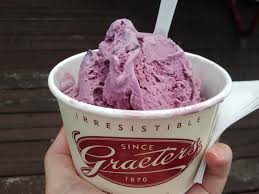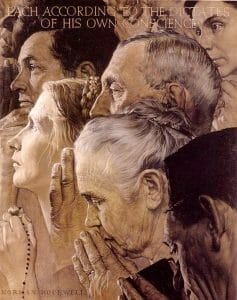My daughter had big plans for her twenty-first birthday. Freedom awaits!

In most states, turning twenty-one means a young person has the freedom to purchase and consume alcoholic beverages without the prohibition of law. It’s a day to party!
Is it? What did Christine do?
She invited a group of friends to celebrate with her at Columbus, Ohio’s famous Graeter’s Ice Cream store.
You see, Christine wasn’t celebrating her right to drink. She was commemorating her freedom of choice. She now had the freedom to choose for herself whether she would drink alcohol. She made the public statement that she chose not to.
The freedom to choose is innate within all of us.
It’s God-given. Theologians call it free-will. Whether it’s the food we eat, the music we listen to on the car radio, or whether we wear a seat-belt, all of us want to make those decisions for ourselves instead of someone making them for us.
The illustration of my daughter might seem silly. My other examples, like whether to wear a seat-belt might suggest that freedom of choice is a bad thing; some things need limits and control to protect ourselves from ourselves. We need laws to restrain our baser nature and to teach us the difference between right and wrong.
Consider this. What if you lived under restrictions that in themselves were wrong? Laws that prohibited you from doing what you believed he Bible taught was right? What if those restrictions pertained particularly to how and where you worshipped God? What if you lived under laws that dictated how you worshipped God, how you tithed money to the Church and how your practiced your faith.

That’s the dilemma our Founding Fathers faced.
That is why fifty-six men signed their names to a declaration of independence during the summer of 1776. A shallow view of history portrays that they were declaring their desire for self-government. At the core, however, was this desire to choose for themselves how they worshipped God.
The Church of England and the state of England at the time were one entity. Any law made by the state, good or bad, was sanctioned by the Church because the state and the Church was one and the same. As leaders sanctioned by the Church and supposedly chosen by God, any law carried a double weight to it. You had to obey because the state told you to and the Church told you to as well.
Moreover, there was only one church-the Church of England. Our forefathers didn’t have the luxury of shopping for a church of their choice like we do in modern day America. If anyone dared to start another church, they were quickly reprimanded and persecuted. That is why the Pilgrims left England. They wanted the freedom to choose their own church and to worship, minister and operate under their own governing structure. To the state-church, this bordered on treason.
You can read more about this separation in my article, “The Real Freedom Fighters” in the Lookout magazine.
Choose this day whom you will serve

Our forefathers didn’t want someone else pushing man made rules diametrically opposed to what the Bible taught. They no longer wanted to participate in a religion based on an outward form that propagated self-greed and avarice. Even if they ran the risk of making bad choices, they wanted the freedom to choose.
This Fourth of July, celebrate what your forefather bought with their blood for you. The freedom to worship God as you perceive in the Bible. The right to choose a congregation of your choice. The right to make decisions based on the moral compass God has given you.
Yes, the United States is not perfect. More and more, Christians are feeling the squeeze of unjust, hostile-to-religion laws. In spite of that, we still claim far more freedom than what our Founding Father experienced under the state and Church of England.
Celebrate and cherish your freedom, the freedom to choose what is right.

Leave a Reply